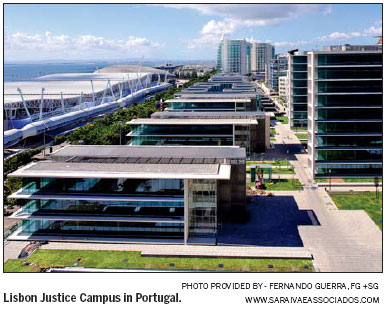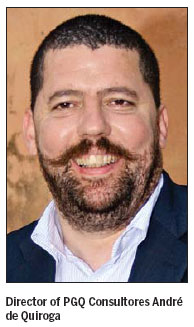China-Europe
Internationalization is the key to growth
Updated: 2011-06-28 08:20
(China Daily)


China's burgeoning middle class and demand for expertise spell opportunity for savvy Portuguese companies
With a relatively small population, the most innovative companies have internationalization as their watchword. As Andr de Quiroga, the dynamic director of PGQ, a consultancy that specializes in institutional relations, internationalization, strategies of communications and image said: "China and Portugal can keep benefiting each other in all areas of industrial activity."
Portugal is also making waves in the fields of technology and energy. Renewable energy in Portugal was the source of 45 percent of the country's electricity generation in 2010 - an increase of 28 percent in five years, showing considerable leadership in this field.
Up to 2010, the government's main energy priorities focused on the introduction of natural gas, which will gradually replace oil and coal, and the liberalization of the energy market. For the current decade, however, its efforts will center on energy efficiency and the increased use of renewables, with one company taking prime responsibility: Redes Energticas Nacionais (REN).
As the national power transmitter and operator of the national high pressure natural gas transmission network, REN has been investing heavily in technology and human resources to make sure Portugal's power grid stays at the forefront of European and global innovations, winning a 45-year concession in 2008 and so a promising and sustainable future.
As one of the few companies in the world that manages electricity and natural gas networks, REN has been called Portugal's "energy highway." Its current privatization drive is a massive opportunity for investors to see the country's energy sector as one of the most promising businesses in the coming decades.
As the world moves towards renewable energies, REN becomes even more attractive as a partner, as more than half of Portugal's electricity production comes from renewable sources.
"Wind production is already well developed, but Portugal is also taking its first steps in solar and wave energy production," Rui Cartaxo, CEO of REN said. "We have been awarded a concession to develop an offshore infrastructure prepared to receive innovation projects in wave energy. Besides direct investments, there are also opportunities to buy stakes in Portuguese energy companies, such as EDP, REN or GALP during the privatization stage.
Cartaxo, who wants to transform REN into a world leader in the integration of renewable sources in energy production, said: "Portugal has proved to be an attractive country for foreign investors and especially non-European foreign investors.
"REN has already had conversations with our peers in China, State Grid Corp and found that despite our countries being geographically distant, we share common concerns and interests, such as efficiency in our investments, achieving high levels of quality of energy supply and improving the integration of renewable energy in the national networks to ensure a secure energy supply.
"We also identified mutual areas of interest in developing business in the same areas of the world, especially in emerging economies. For REN, China is also a potential supplier of relevant equipment for the development of our energy infrastructure. These are some of the potential agreements that we can conclude with the Chinese and the cooperation agreement signed between the two countries is a very strong first step."

The country is also holding its own in beverage production, with Unicer - Bebidas de Portugal at a high level in beer sales with 41 percent of total volume.
With 44 percent of the company owned by well-known brand Carlsberg and 56 percent belonging to Portuguese holding company, Viacer, Unicer has a great advantage in the premium beer segment and non-alcoholic beer, which underpins the company's leadership. It is investing massively in advertising and promotion including outdoors, TV, press and sponsorship of sports and music events, and targeting the Lisbon area.
Unicer's Board Member, Antnio Vaz Branco, said: "We are strategically controlled by the Viacer Group, whose 20-year relationship with Carlsberg plays a vital role in the Unicer's development. We benefit from the skills, assets and knowledge of Carlsberg in critical areas, such as production and logistics, marketing and innovation.
"When we started our internationalization program 10 years ago, it was very important for us to have vision and strategy. Portugal has a small population, and a small market, so we need to look elsewhere. The first step was to approach Portuguese speaking countries, and now we are exporting to more than 50 countries around the world and growing at around 20 percent a year.
"In 2000, we exported 20 million liters from Portugal; nowadays we are exporting more than 200 million. We now have 75 percent of the export market. Our main buyer is Angola and we will obviously keep tapping the African markets. We also have two distributors in Macao, two in Hong Kong and four in Chinese mainland."
Although it is early days, Branco believes that as purchasing power increases in China, so will its demand for world beers.
"This is the trend we want to exploit," he said. "Our products have the required success attributes for the market; a distinctive origin and excellence in quality."
China will also be very important to Innovnano, a technology-driven specialized company that produces a wide range of nanomaterials through a unique, patented process. "We are not there yet," said Andr de Albuquerque, CEO, "but there is a lot of investigation within the Chinese universities and it is therefore a market of great potential. We are having talks with distributors. It's a start.
"Innovnano is in a good position. We have been working in the sector for many years so we already have knowledge. The source of our competitive advantage is a technological one. It is a unique process that we developed that allows us to produce a broad range of nanomaterials. We have huge flexibility."
In the meantime, ISQ, a techno-scientific firm with 40 years of history, has been recording excellent growth despite the recession. Chairman J.M. Dias Miranda said: "ISQ can offer expertise in industrial security, innovation and quality, which is something China needs. Portugal is at the top in terms of innovation, technology and development, and that is acknowledged internationally. What Portugal is missing is an industrial base and investment in transactional products. Foreign investment is needed."
Finally, as it celebrates the opening of new offices in Beijing, architecture and urban planning firm Saraiva and Associados is looking forward to working with its Chinese clients on exciting new developments.
Having worked alongside Chinese contractors in Brazil and numerous African countries, the 15-year-old company is looking forward to what founder and CEO Miguel Saraiva says has been a giant step in the firm's history.
"What separates us from the rest is a bit of character," he says. "We try to be conceptual but at the same time understand the function of what we are building and why we are building it. We adapt easily to the local market, where we have our know-how and are very serious about our work."
E-paper

Pearl paradise
Dreams of a 'crazy' man turned out to be a real pearler for city
Literary beacon
Venice of china
Up to the mark
Specials

Power of profit
Western companies can learn from management practices of firms in emerging economies

Foreign-friendly skies
About a year ago, 48-year-old Roy Weinberg gave up his job with US Airways, moved to Shanghai and became a captain for China's Spring Airlines.

Plows, tough guys and real men
在这个时代,怎样才"够男人"? On the character "Man"
